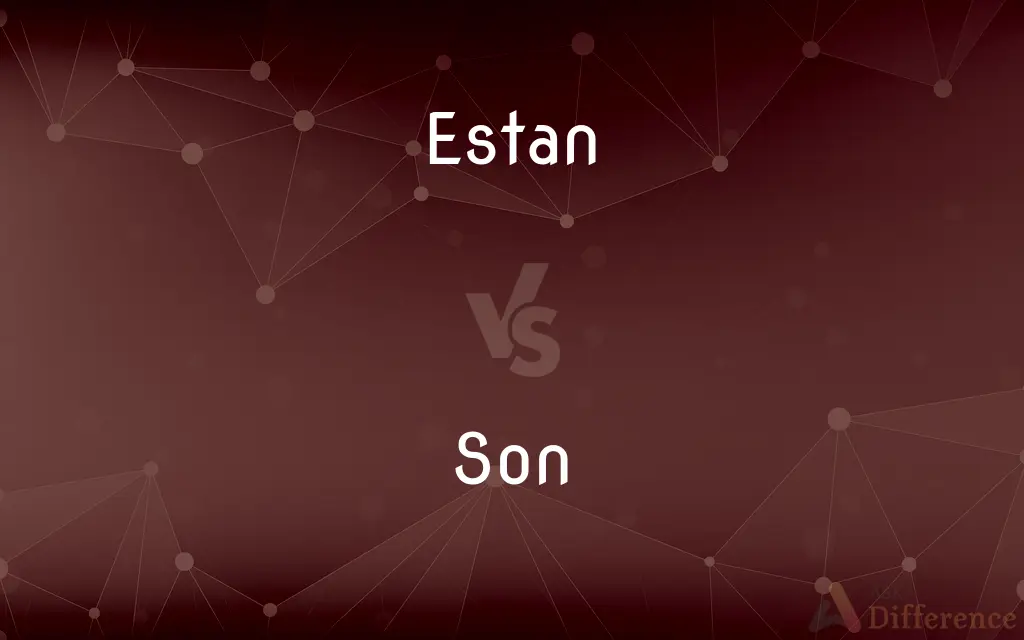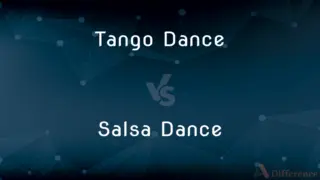Estan vs. Son — What's the Difference?
Edited by Tayyaba Rehman — By Fiza Rafique — Published on December 19, 2023
"Estan" and "Son" are both third-person plural forms of the Spanish verb "ser" and "estar" respectively. While "Estan" implies a state or condition, "Son" denotes identity or characteristics.

Difference Between Estan and Son
Table of Contents
ADVERTISEMENT
Key Differences
"Estan" and "Son" are both integral components of the Spanish language, essential for expressing the verb "to be". These words are central to the distinction in Spanish between permanent and temporary conditions or states.
"Estan" stems from the verb "estar". This word often communicates temporary states, locations, or emotions. For instance, expressing feelings like happiness or sadness uses "estan". Conversely, "Son" is a derivative of "ser" and is employed to describe inherent qualities or identities.
When discussing location, "Estan" is the go-to choice. For instance, when stating that people are at a specific place, "Estan" is utilized. However, "Son" is used when referring to the origin of someone or the material of something.
Time and dates, which are perceived as permanent in nature, utilize "Son". Meanwhile, "Estan" is perfect for depicting changing or fluctuating situations.
A simple rule of thumb can be: use "Son" for things that are unlikely to change and "Estan" for things that are variable or have the potential to change.
ADVERTISEMENT
Comparison Chart
Originating Verb
Comes from "estar".
Comes from "ser".
Typical Use
Temporary states, locations, emotions.
Inherent qualities, identities, origin, time, and dates.
Time Frame
Often depicts changing or fluctuating situations.
Represents permanent or long-lasting conditions.
Examples
"Están felices" (They are happy).
"Son las cinco" (It is five o'clock).
Physical Locations
Used to denote current location.
Used for origin or inherent nature of things.
Compare with Definitions
Estan
Is used for expressing location.
Ellos están en la escuela. (They are at the school.)
Son
Describes origin or nature.
Ellos son de España. (They are from Spain.)
Estan
Describes emotions or feelings.
Ellos están contentos. (They are happy.)
Son
Refers to identity or inherent characteristics in Spanish.
Ellos son médicos. (They are doctors.)
Estan
Indicates a changeable or potential to change state.
Las flores están marchitas. (The flowers are wilted.)
Son
Used to tell time and dates.
Son las tres de la tarde. (It is three in the afternoon.)
Estan
Originates from the verb "estar".
Están escuchando música. (They are listening to music.)
Son
Originates from the verb "ser".
Ellos son hermanos. (They are brothers.)
Estan
Refers to a temporary state or condition in Spanish.
Ellos están cansados. (They are tired.)
Son
Indicates unchangeable characteristics.
Ellos son altos. (They are tall.)
Son
One's male child.
Son
A male descendant.
Son
A man considered as if in a relationship of child to parent
A son of the soil.
Son
One personified or regarded as a male descendant.
Son
Used as a familiar form of address for a young man.
Son
Son(Christianity) The second person of the Trinity.
Son
One's male offspring.
Before the birth of the man's child, he said: "I want a son, not a daughter."
Son
A male adopted person in relation to his adoptive parents.
Son
A male person who has such a close relationship with an older or otherwise more authoritative person that he can be regarded as a son of the other person.
Son
A male person considered to have been significantly shaped by some external influence.
He was a son of the mafia system.
Son
A male descendant.
The pharaohs were believed to be sons of the Sun.
Son
A familiar address to a male person from an older or otherwise more authoritative person.
Son
An informal address to a friend or person of equal authority.
Son
(computing) The current version of a file, derived from the preceding father file.
Son
(music genre) Son cubano, a genre of music and dance blending Spanish and African elements that originated in Cuba during the late 19th century.
Son
(transitive) To produce (i.e. bear, father, beget) a son.
Son
(transitive) To address (someone) as "son".
Son
A male child; the male issue, or offspring, of a parent, father or mother.
Sarah conceived, and bare Abraham a son.
Son
A male descendant, however distant; hence, in the plural, descendants in general.
I am the son of the wise, the son of ancient kings.
I am the Lord, I change not; therefore ye sons of Jacob are not consumed.
Son
Any young male person spoken of as a child; an adopted male child; a pupil, ward, or any other young male dependent.
The child grew, and she brought him unto Pharaoh's daughter, and he became her son.
Be plain, good son, and homely in thy drift.
Son
A native or inhabitant of some specified place; as, sons of Albion; sons of New England.
Son
The produce of anything.
Earth's tall sons, the cedar, oak, and pine.
Son
Jesus Christ, the Savior; - called the Son of God, and the Son of man.
We . . . do testify that the Father sent the Son to be the Savior of the world.
Who gave His Son sure all has given.
Son
A male human offspring;
Their son became a famous judge
His boy is taller than he is
Son
The divine word of God; the second person in the Trinity (incarnate in Jesus)
Common Curiosities
Are "Estan" and "Son" interchangeable?
No, "Estan" denotes temporary conditions while "Son" implies permanence or identity.
How about "Son"?
"Son" is derived from the verb "ser".
Which verb does "Estan" come from?
"Estan" is from the verb "estar".
Can "Estan" be used for emotions?
Yes, for example, "Están felices" means "They are happy".
Is "Son" used for time?
Yes, e.g., "Son las diez" translates to "It's ten o'clock".
How do I use "Estan" for locations?
You can say "Ellos están en el parque" which means "They are in the park".
Do both "Estan" and "Son" refer to plural subjects?
Yes, both refer to "they" or "you all" in English.
Can "Estan" describe physical states?
Yes, like "Ellos están mojados", which means "They are wet".
Is "Estan" used for ongoing actions?
Yes, like in "Ellos están corriendo", meaning "They are running".
Can "Son" describe origin?
Yes, "Ellos son de México" means "They are from Mexico".
What's a key difference between "Estan" and "Son"?
"Estan" often depicts changeable states, while "Son" denotes permanent characteristics.
Can "Son" describe professions?
Yes, "Ellos son profesores" means "They are teachers".
How do I choose between "Estan" and "Son"?
Consider if the situation is temporary (Estan) or permanent/identifying (Son).
How would I use "Son" for inherent traits?
An example is "Ellos son inteligentes", meaning "They are intelligent".
How do I say "They are my friends"?
You'd say "Ellos son mis amigos".
Share Your Discovery

Previous Comparison
Tango Dance vs. Salsa Dance
Next Comparison
MLA vs. APAAuthor Spotlight
Written by
Fiza RafiqueFiza Rafique is a skilled content writer at AskDifference.com, where she meticulously refines and enhances written pieces. Drawing from her vast editorial expertise, Fiza ensures clarity, accuracy, and precision in every article. Passionate about language, she continually seeks to elevate the quality of content for readers worldwide.
Edited by
Tayyaba RehmanTayyaba Rehman is a distinguished writer, currently serving as a primary contributor to askdifference.com. As a researcher in semantics and etymology, Tayyaba's passion for the complexity of languages and their distinctions has found a perfect home on the platform. Tayyaba delves into the intricacies of language, distinguishing between commonly confused words and phrases, thereby providing clarity for readers worldwide.











































